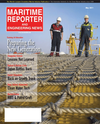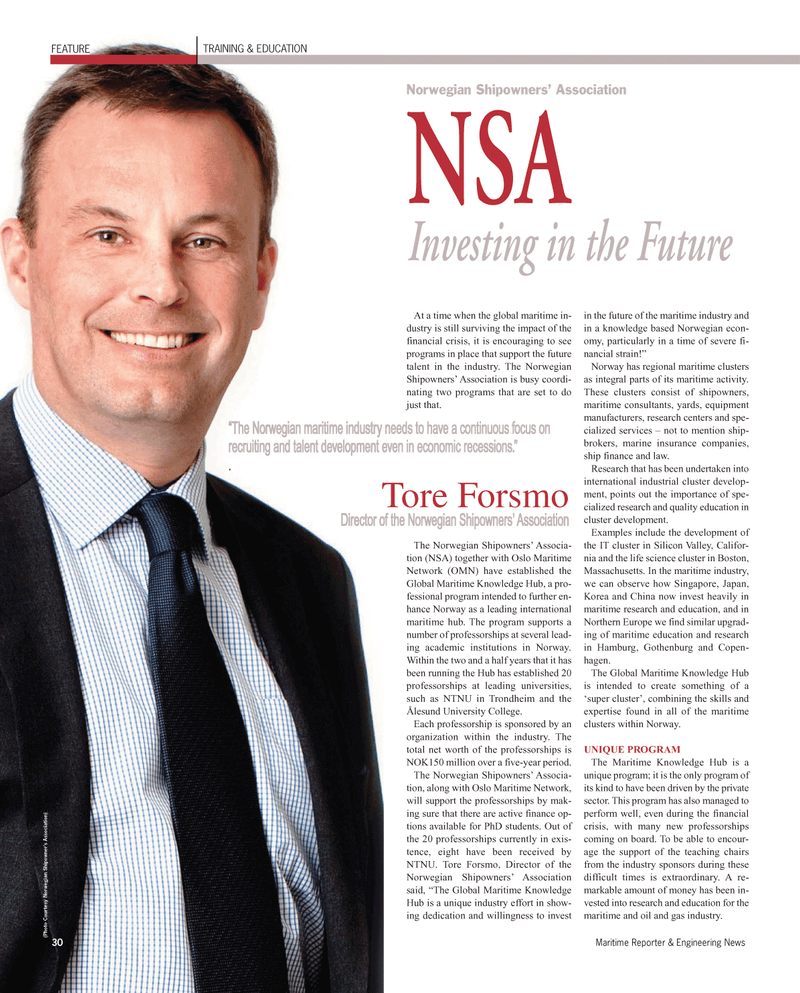
Page 30: of Maritime Reporter Magazine (May 2011)
Training & Education Edition
Read this page in Pdf, Flash or Html5 edition of May 2011 Maritime Reporter Magazine
At a time when the global maritime in- dustry is still surviving the impact of the financial crisis, it is encouraging to see programs in place that support the future talent in the industry. The Norwegian
Shipowners’ Association is busy coordi- nating two programs that are set to do just that.
The Norwegian Shipowners’ Associa- tion (NSA) together with Oslo Maritime
Network (OMN) have established the
Global Maritime Knowledge Hub, a pro- fessional program intended to further en- hance Norway as a leading international maritime hub. The program supports a number of professorships at several lead- ing academic institutions in Norway.
Within the two and a half years that it has been running the Hub has established 20 professorships at leading universities, such as NTNU in Trondheim and the
Ålesund University College.
Each professorship is sponsored by an organization within the industry. The total net worth of the professorships is
NOK150 million over a five-year period.
The Norwegian Shipowners’ Associa- tion, along with Oslo Maritime Network, will support the professorships by mak- ing sure that there are active finance op- tions available for PhD students. Out of the 20 professorships currently in exis- tence, eight have been received by
NTNU. Tore Forsmo, Director of the
Norwegian Shipowners’ Association said, “The Global Maritime Knowledge
Hub is a unique industry effort in show- ing dedication and willingness to invest in the future of the maritime industry and in a knowledge based Norwegian econ- omy, particularly in a time of severe fi- nancial strain!”
Norway has regional maritime clusters as integral parts of its maritime activity.
These clusters consist of shipowners, maritime consultants, yards, equipment manufacturers, research centers and spe- cialized services – not to mention ship- brokers, marine insurance companies, ship finance and law.
Research that has been undertaken into international industrial cluster develop- ment, points out the importance of spe- cialized research and quality education in cluster development.
Examples include the development of the IT cluster in Silicon Valley, Califor- nia and the life science cluster in Boston,
Massachusetts. In the maritime industry, we can observe how Singapore, Japan,
Korea and China now invest heavily in maritime research and education, and in
Northern Europe we find similar upgrad- ing of maritime education and research in Hamburg, Gothenburg and Copen- hagen.
The Global Maritime Knowledge Hub is intended to create something of a ‘super cluster’, combining the skills and expertise found in all of the maritime clusters within Norway.
UNIQUE PROGRAM
The Maritime Knowledge Hub is a unique program; it is the only program of its kind to have been driven by the private sector. This program has also managed to perform well, even during the financial crisis, with many new professorships coming on board. To be able to encour- age the support of the teaching chairs from the industry sponsors during these difficult times is extraordinary. A re- markable amount of money has been in- vested into research and education for the maritime and oil and gas industry. 30 Maritime Reporter & Engineering News
FEATURE TRAINING & EDUCATION
NSA
Investing in the Future “The Norwegian maritime industry needs to have a continuous focus on recruiting and talent development even in economic recessions.” .
Tore Forsmo
Director of the Norwegian Shipowners’ Association (Photo Cour tesy Nor wegian Shipowner’ s Association)
Norwegian Shipowners’ Association

 29
29

 31
31
